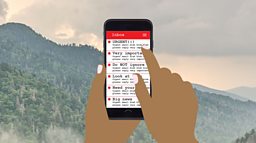All work and no rest? These seven tips will help you strike a better balance

Whether you’re a slave to the 9-5 grind, the master of your own freelance destiny or pouring your passion and creativity into a side project that completes you, the struggle for balance between work and rest can be very real.
Improvements in tech and changing attitudes are fuelling the pressure to be ‘always on’ - but all #werkwerkwerk and no play can have serious consequences for our health and happiness.
Lauren Laverne sat down with four women working at the coalface of all that #Girlboss pressure for Late Night Woman’s Hour. Here are their tips for achieving a bit more harmony…
Try a part-time ‘digital detox’
“One of the things we find in research is that not participating in digital culture is not an option,” says Dr Zeena Feldman - whether it's keeping in touch on Facebook or job hunting on Linked In.
“So what we need to do is really think about what role we want these technologies to play in our lives."
But while a fancy digital detox camp (a real thing) might charge you hundreds of pounds to separate you from your smartphone for a week, Zeena recommends starting small with “accessible modes of resistance”.
“Don't put your work email on your smartphone. Don't check your work email after a certain time in the evening, and don't check it on weekends.”
Set some work and rest boundaries
Writer and podcaster Emma Gannon quit her job with a publisher to make her hobby her career.
“It sounds like the dream on paper, but I've had to really look at myself in the mirror and define what work and rest mean to me, because I don't know that I'm working sometimes.”
“When your office is your room, your office swiftly becomes your bed and then your workwear becomes pyjamas,” adds Rosie Fletcher, a writer and comedian who’s worked from home since developing ME.
“But I have quite regimented work and rest periods, and I have quite high productivity - because when I work, I really work.”

Be wise to others ‘acting’ busy (and resist the urge to do it yourself)
“I've had ME for four years and in that time I've seen all the hashtags like #hustlehard and #girlboss take off,” says Rosie. “It's very performative - you're not just working, you have to be seen to be working.”
But Zeena says a recent study found that out of 9 hours in the building, the average British office worker might only spend a paltry three hours doing any productive work – with the rest reserved for “social media, making personal phone calls and chatting with colleagues”.
“There’s performative rest as well,” adds Rosie, “and I’m as guilty of this as anyone. Nice ladies on Instagram with their beautiful duvet covers all mussed up around them on a Sunday morning. ‘Don't worry, we're resting hard!’.”
Invest some time in a ‘side hustle’
While a side project might sound like MORE work to some, having a creative or money-making outlet that is all yours can be hugely satisfying and even lead to a career change down the line.
“I wrote my last book while having a full-time job, writing on the weekends, and it was quite fun and restful,” says Emma.
“I don't sell the whole ‘quit your job tomorrow and follow your dreams!’ idea, but if you can escape even half an hour to an hour of your time a week to slowly drip feed into a side project, it [can be] amazing.”
Don’t forget about sleep
“There is this moral judgement that we attach to rest these days,” says Zeena. “It's good to be really busy and overworked and overcommitted - and the flip side is there's perhaps something lazy or wrong with you if you're resting too much.”
Likewise, Lauren Laverne points out that getting enough shut eye can often be presented as a tool to help you “perform at a top level. It's not actually about you feeling better, it's about how it will make you more effective.”
But when sleep also builds our emotional resilience, boosts our immune system and makes us all a lot less grumpy – we should all be making it a priority.

Listen to your body
Emma remembers being too scared of her boss to take regular toilet breaks, and ending up with cystitis, while Rosie is convinced the fear of losing her internship contributed to her becoming ill.
“I was hospitalised with gastroenteritis and I was like, ‘well, I've had my 5 days off and I won't get any more sick pay, so I'll go back to work. I declined over the next year and finally got full blown ME.
“Now I'll get messages from friends, ‘I've got a terrible cold’… Well, why are you at work if you're ill? So many people are precariously employed and feel like they can't take time off. I feel like I'm the warning from history - you have to look after yourself!”
Make an actual appointment with your rest time
“If we don’t actually put something in the diary, it will never happen - we'll never take that time for ourselves,” warns Zeena.
“At 4 o’clock I get my tea tray,” says Rosie, “I like to sit down and watch something terrible, but it's making time for myself, that I'm not going to do anything else in.”
Late Night host and super-juggler Lauren adds: “You need a third thing. I have a very busy life and you need this extra space that is neither work and also not for the benefit of family.
“I like running, I love it, but I also make myself listen to music that I can't play on the radio… and I also read. [It’s] just forcing yourself to do something that isn't going to get you anywhere productive, and doesn't make the house tidier.”
Listen to Late Night Woman’s Hour: Work and Rest for much more on the subject, and don't forget to subscribe to the new Late Night Woman’s Hour podcast to make sure you never miss an episode.




